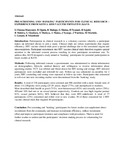| dc.contributor.author | Omosa-Manyonyi, G | |
| dc.contributor.author | Ogutu, H | |
| dc.contributor.author | Malogo, R | |
| dc.contributor.author | Mutua, G | |
| dc.contributor.author | Nyasani, D | |
| dc.contributor.author | Sajabi, R | |
| dc.contributor.author | Mahira, R | |
| dc.contributor.author | Ouattara, G | |
| dc.contributor.author | Mutisya, E | |
| dc.contributor.author | Maina, A | |
| dc.contributor.author | Nyange, J | |
| dc.contributor.author | Wairimu, J | |
| dc.contributor.author | Muriuki, M | |
| dc.contributor.author | Lunani, L | |
| dc.contributor.author | Ndambuki, R | |
| dc.date.accessioned | 2013-11-29T13:20:55Z | |
| dc.date.available | 2013-11-29T13:20:55Z | |
| dc.date.issued | 2013-06 | |
| dc.identifier.citation | G Omosa-Manyonyi, H Ogutu, R Malogo, G Mutua, D Nyasani, R Sajabi, R Mahira, G Ouattara, E Mutisya, A Maina, J Nyange, J Wairimu, M Muriuki, L Lunani, R Ndambuki; Pre-screening And ‘banking’ Participants For Clinical Research – Experience From Kenya Aids Vaccine Initiative (kavi),presented at the 2nd International Scientific Conference, CHS And KNH, 19th - 21st June 2013. | en |
| dc.identifier.uri | http://hdl.handle.net/11295/61141 | |
| dc.description | Pre-screening And ‘banking’ Participants For Clinical Research – Experience From Kenya Aids Vaccine Initiative (kavi),presented at the 2nd International Scientific Conference, CHS And KNH, 19th - 21st June 2013. | en |
| dc.description.abstract | Introduction: Participation in clinical research is a voluntary exercise whereby
a participant makes an informed choice to join a study. Clinical trials are
robust experiments that require efficiency. HIV vaccine clinical trials pose a
special challenge due to the associated stigma and misconceptions. Participant
recruitment into HIV vaccine clinical trials therefore requires special attention
to the informed consent process resulting in slow participant recruitment rate. To
address this, KAVI designed a study aimed at ‘banking’ participants for potential
participation in future studies at KAVI.
Methods: Following informed consent a questionnaire was administered to
obtain information on demographics, lifestyle, medical history and willingness
to receive information about upcoming studies. VCT was offered and blood
drawn for HIV testing and storage. HIV infected participants were excluded
and referred for care. Follow-up was scheduled six-monthly for 2 years; HIV
counseling and testing were repeated at follow-up visits. Participants that
consented to roll-over into new recruiting studies were discontinued from the
‘banking’ study.
Results: A total of 336 participants were screened and 306 enrolled with a male:
female ratio of about 1:1.2.Majority were young (25-29 years), single (77%),
and unemployed or students.
Most described their health as good (71%), were heterosexual (92%) and sexually
active (78%); 49%and 10% had one or no sexual partner respectively. Condom
use was high (regular partner 81%, casual partners 86%); 88% believed that
they were HIV-uninfected. A total of 77 participants (23%) consented and rolled
over to new studies, 50 of these consented for 2 HIV vaccine clinical trials that
required 80 participants.
Conclusion: Pre-screening and ‘banking’ participants for future studies can
supplement direct recruitment from the community and increase recruitment
efficiency, reduce recruitment effort,and improve participant retention and
compliance with procedures. There is need for further studies to understand the
participants’ decision-making process in volunteering for clinical research. | en |
| dc.language.iso | en | en |
| dc.publisher | University of Nairobi | en |
| dc.title | Pre-screening And ‘banking’ Participants For Clinical Research – Experience From Kenya Aids Vaccine Initiative (kavi) | en |
| dc.type | Presentation | en |
| local.publisher | College of Health Sciences | en |

